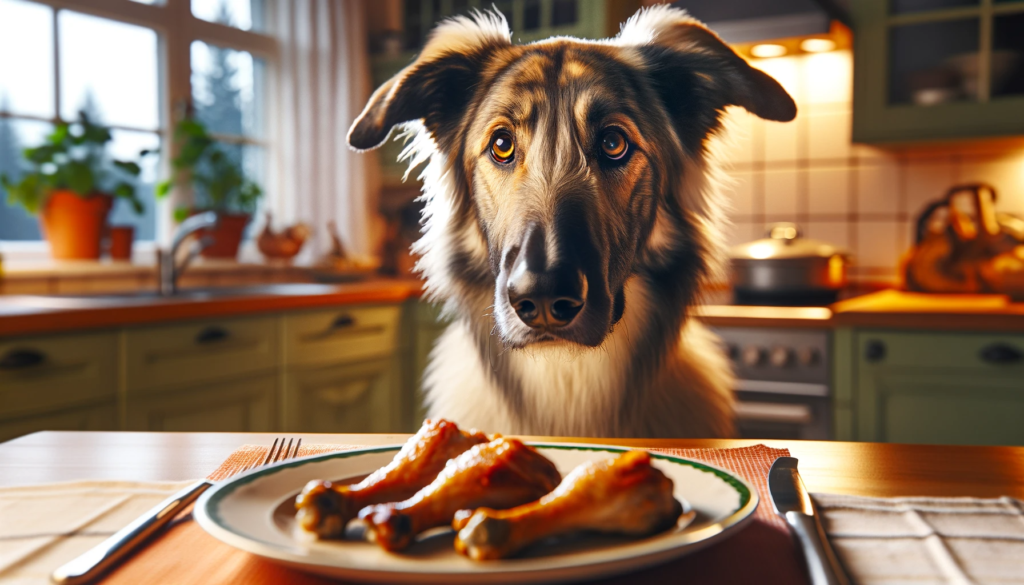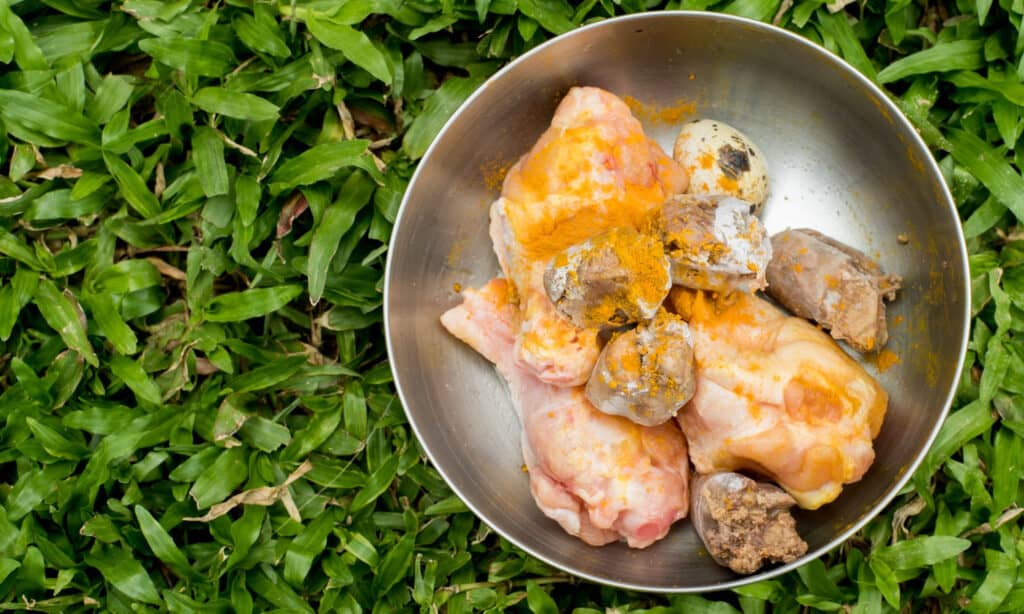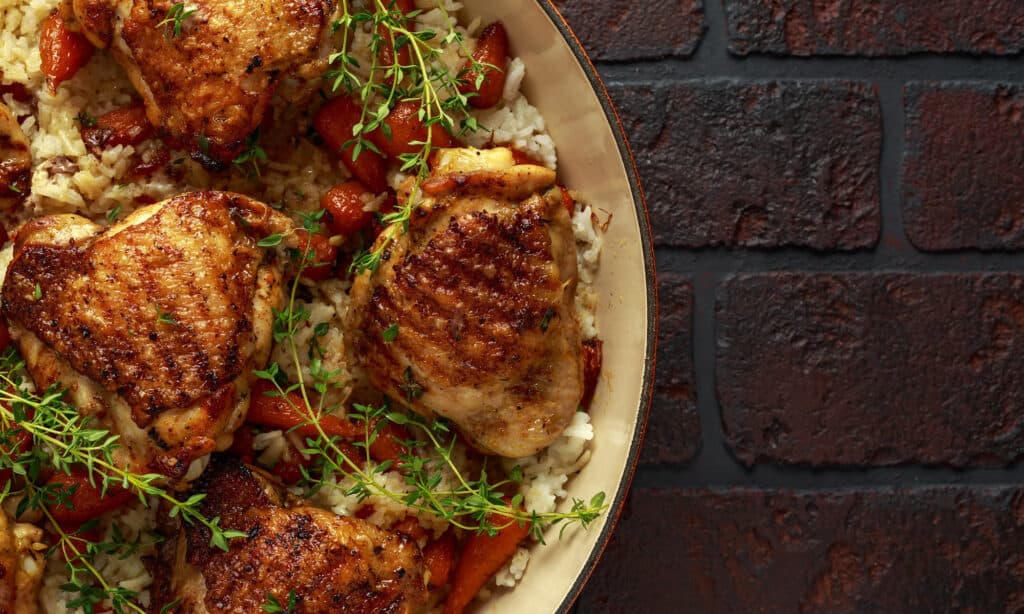Are you a dog owner who enjoys sharing your favorite meals with your four-legged companion? You might be wondering if chicken thighs are safe for your furry friend to enjoy. In this blog, we will explore the question, “Can dogs eat chicken thighs, raw or cooked?” We’ll delve into the nutritional benefits, potential risks, and best practices for sharing chicken thighs with your pet. By the end of this article, you will have gained the knowledge needed to make informed decisions about your dog’s diet, ensuring their health and happiness.

Nutritional Benefits of Chicken Thighs for Dogs
Chicken thighs can be a delicious and healthy treat for your furry friend. They offer various benefits for your dog’s well-being. Let’s chat about why chicken thighs can be a great addition to your pup’s diet:
- Top-notch protein: Chicken thighs are packed with high-quality protein that your dog needs for growth, strong muscles, and overall health. Protein is essential for healthy skin, a shiny coat, and a robust immune system, making it a key part of your pet’s diet.
- Good fats: Chicken thighs have more fat than other cuts, like chicken breast. While you should keep an eye on your dog’s fat intake, these healthy fats provide energy and help absorb important vitamins like A, D, E, and K. They also support brain function, hormone production, and overall well-being.
- Vitamins and minerals galore: These tasty morsels are rich in essential vitamins and minerals, including B vitamins (such as B3 and B6), phosphorus, iron, and zinc. These nutrients play a significant role in your dog’s health, helping with things like cellular metabolism, strong bones, and a healthy immune system.
- Amino acids: Chicken thighs are an excellent source of essential amino acids that your dog can’t produce on their own. These amino acids help build and repair tissues, maintain muscle mass, and support various bodily functions.
While chicken thighs can be a nutritious addition to your dog’s diet, you should include them in a balanced meal. A well-rounded diet ensures your pet gets all the nutrients they need to stay healthy and happy. Don’t forget to consult your veterinarian for advice on your dog’s specific dietary needs.
Can Dogs Eat Raw Chicken Thighs?
Pros:
- Natural diet: Some dog owners believe that a raw diet, including raw chicken thighs, is closer to the natural diet of wild canines. They argue that raw food can lead to various health benefits for their pets.
- Health benefits: Proponents of raw feeding claim that it can result in shinier coats, healthier skin, improved digestion, and increased energy levels in dogs.
Cons:
- Bacterial contamination: Raw chicken may carry harmful bacteria such as Salmonella and Campylobacter, which can lead to severe gastrointestinal issues in dogs and even transmit to humans through contact with contaminated surfaces.
- Parasites: Raw chicken can also harbor parasites, such as Toxoplasma gondii, which can lead to health problems if ingested by your dog.
- Bone fragments: Raw chicken bones can splinter and cause blockages or injuries to your dog’s digestive system. Choking hazards and broken teeth are other concerns associated with feeding raw bones to dogs.
Precautions:
If you decide to feed your dog raw chicken thighs, take the following precautions to minimize risks:
- Purchase fresh, high-quality chicken from a trusted source to reduce the chances of bacterial contamination and parasites.
- Keep your dog’s eating area and utensils clean and sanitized to prevent the spread of bacteria.
- Monitor your dog while they eat to ensure they don’t choke on bone fragments.
- Consult your veterinarian about your dog’s specific dietary needs and the potential risks and benefits of feeding raw chicken thighs.
Dogs can eat raw chicken thighs, but there are potential risks involved. So, weigh the pros and cons and take necessary precautions if you choose to feed your pet raw chicken. Always consult your veterinarian for personalized advice on your dog’s diet.

Can Dogs Eat Cooked Chicken Thighs?
Dogs can indeed enjoy cooked chicken thighs, which can be a tasty and nutritious treat. Cooking chicken thighs properly can help eliminate harmful bacteria and parasites, making them safer for your dog to consume. Let’s discuss how to prepare cooked chicken thighs for your furry friend and the precautions you should take:
- Cooking methods: To maintain the nutritional value of chicken thighs while ensuring they’re safe for your dog, opt for healthier cooking methods such as baking, boiling, or grilling. These methods will cook the chicken thoroughly without adding unhealthy fats or potentially harmful seasonings.
- Avoid unsafe practices: Frying chicken thighs is not recommended. This adds excess fat and calories that can be unhealthy for your dog. Also, avoid using seasonings, spices, and sauces, as they may contain ingredients that are toxic or harmful to your pet, such as onion, garlic, or excessive salt.
- Remove bones: Cooked chicken bones can be particularly dangerous for dogs. They can splinter easily, posing choking hazards and potential injuries to your dog’s digestive system. Before serving cooked chicken thighs to your pet, be sure to remove all bones, including smaller fragments.
- Portion control: Chicken thighs are a good source of protein and other nutrients. It’s important to manage portion sizes and avoid overfeeding your dog. Excessive calorie intake can lead to obesity and other health issues. Consult your veterinarian for guidance on appropriate portion sizes based on your dog’s age, weight, and activity level.
Dogs can safely eat cooked chicken thighs when prepared with their health in mind. Choose healthier cooking methods, avoid adding unsafe seasonings or ingredients, and be sure to remove all bones before serving. As always, consult your veterinarian for personalized advice on your dog’s dietary needs and portion sizes.

Alternatives to Chicken Thighs for Dogs
If you’re looking for alternatives to chicken thighs for your dog, there are plenty of nutritious options available. Here are some suggestions for other protein sources that can provide a balanced diet and meet your dog’s nutritional needs:
- Chicken breast: Chicken breast is a leaner cut of meat compared to chicken thighs. It’s high in protein and lower in fat, making it a great option for dogs that need to watch their fat intake or are prone to weight gain.
- Turkey: Turkey is another lean protein source that is rich in essential nutrients like B vitamins, selenium, and phosphorus. Both ground turkey and turkey breast can be excellent choices for dogs, just make sure to cook them thoroughly and remove any bones.
- Fish: Fish, such as salmon, tuna, or sardines, are a fantastic source of protein and healthy omega-3 fatty acids. These fatty acids support your dog’s skin, coat, and cognitive health. Be sure to cook the fish thoroughly to kill parasites and remove any bones before serving it to your pet.
- Lean beef: Lean cuts of beef, like sirloin or ground beef with a low-fat percentage, are high in protein and essential nutrients like iron and zinc. Cook the beef thoroughly and avoid adding any seasonings or spices that could be harmful to your dog.
- Lamb: Lamb is another protein option that can be easily digested by most dogs. It’s an excellent source of essential nutrients like zinc and B vitamins. As with other meat options, cook the lamb thoroughly and remove any bones before feeding it to your pet.
- Commercial dog food: High-quality commercial dog food, whether dry kibble or wet canned food, is formulated to meet your dog’s nutritional needs. Look for brands that use whole meat ingredients and have limited fillers or artificial additives.
Consult Your Veterinarian
Your vet is a valuable resource who can provide personalized advice and guidance. Here’s why it’s essential to consult your veterinarian about your dog’s diet:
- Individualized advice: Every dog is unique, and their dietary needs can vary widely. Your vet can assess your dog’s specific needs and recommend the best food options, portion sizes, and feeding schedules tailored to your pet’s individual requirements.
- Addressing health concerns: Certain health conditions, such as allergies, digestive issues, or weight problems, may require adjustments to your dog’s diet. Your veterinarian can help identify these issues and suggest dietary changes that will best support your dog’s health.
- Ensuring a balanced diet: A well-rounded diet is key to maintaining your dog’s overall health. Your vet can provide guidance on the right balance of protein, fat, carbohydrates, vitamins, and minerals your dog needs, and recommend high-quality commercial dog food brands or homemade recipes.
- Introducing new foods: If you’re considering adding new protein sources, such as chicken thighs or alternatives, to your dog’s diet, your veterinarian can offer advice on how to do so safely and gradually to prevent digestive upset.
- Monitoring progress: Regular check-ups with your veterinarian enable the monitoring of your dog’s health, ensuring that their dietary needs are met as they age or experience changes in activity levels.
Consulting your veterinarian about your dog’s diet is vital for maintaining their overall health and happiness. By working closely with your vet, you can make informed decisions about your pet’s nutrition and provide them with a balanced, safe, and satisfying diet tailored to their individual needs.

Conclusion
Feeding your dog chicken thighs, whether raw or cooked, can be a nutritious and enjoyable treat for your furry companion. However, it’s crucial to consider the potential risks and benefits associated with each option. Always prioritize your dog’s health by providing them with a balanced diet, which may include alternative protein sources.
Consulting your veterinarian is essential for understanding your dog’s specific dietary needs and making informed decisions about their nutrition. By working closely with your vet and following their advice, you can ensure your dog maintains optimal health and enjoys a long, happy life by your side. Remember, a well-nourished dog is a happy dog!
